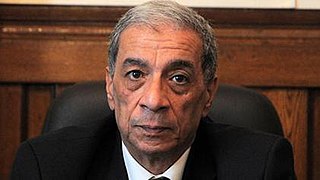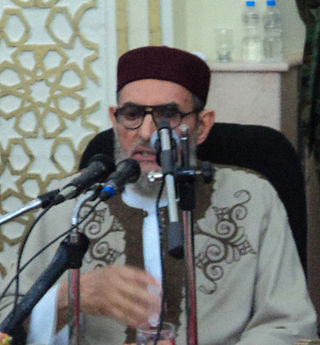Related Research Articles

The Society of the Muslim Brothers, better known as the Muslim Brotherhood, is a transnational Sunni Islamist organization founded in Egypt by Islamic scholar and schoolteacher Hassan al-Banna in 1928. Al-Banna's teachings spread far beyond Egypt, influencing today various Islamist movements from charitable organizations to political parties.
The Muslim Brotherhood is an Islamic organization that was founded in Ismailia, Egypt by Hassan al-Banna in March 1928 as an Islamist religious, political, and social movement. The group spread to other Muslim countries but has its largest, or one of its largest, organizations in Egypt, where for many years it has been the largest, best-organized, and most disciplined political opposition force, despite a succession of government crackdowns in 1948, 1954, 1965 after plots, or alleged plots, of assassination and overthrow were uncovered. Following the 2011 Revolution the group was legalized, and in April 2011 it launched a civic political party called the Freedom and Justice Party (Egypt) to contest elections, including the 2012 presidential election when its candidate Mohamed Morsi became Egypt's first democratically elected president. One year later, however, following massive demonstrations, Morsi was overthrown by the military and arrested. As of 2014, the organization has been declared a terrorist group by Russia, Egypt, UAE, Saudi Arabia and is once again suffering a severe crackdown.

Ali Gomaa is an Egyptian Islamic scholar, jurist, and public figure who has taken a number of controversial political stances. He specializes in Islamic Legal Theory. He follows the Shafi`i school of Islamic jurisprudence and the Ash'ari school of tenets of faith. Gomaa is a Sufi. Gomaa is also a supporter of the 2013 Military Coup.
Capital punishment is a legal penalty in Egypt. The state carried out at least 44 executions in 2016, at least 35 in 2017, and at least 43 in 2018. On 8 September 2020, a court in Egypt sentenced 75 people to death and 47 others to life imprisonment. They were charged with murder or membership in a terrorist group. The British newspaper The Independent has reported that Najia Bounaim of Amnesty International Middle East and North Africa described the court's sentence as "disgraceful" and "a mockery of justice". The method of execution is hanging for civilian convictions, and by firing squad for convictions by commissioned military personnel at the time of duty.

The persecution of Copts and the discrimination against Coptic Orthodox Christians are historic and widespread issues in Egypt. They are also prominent examples of the poor status of Christians in the Middle East despite the fact that the religion is native to the Middle East, and its practices are old in the country dating back to the Roman Era. Copts are the Christ followers in Egypt, usually Oriental Orthodox, who currently make up 10 % )the population of Egypt—the largest religious minority of that country. Copts have cited instances of persecution throughout their history and Human Rights Watch has noted "growing religious intolerance" and sectarian violence against Coptic Christians in recent years, as well as a failure by the Egyptian government to effectively investigate properly and prosecute those responsible. However, as political violence is common many churches believe that the attacks against the church are not religious statements, instead political statements. Since 2011 hundreds of Egyptian Copts have been killed in sectarian clashes, and many homes, churches and businesses have been destroyed. In just one province (Minya), 77 cases of sectarian attacks on Copts between 2011 and 2016 have been documented by the Egyptian Initiative for Personal Rights. The abduction and disappearance of Coptic Christian women and girls also remains a serious ongoing problem.

Mohammed Badie is the eighth Supreme Guide of the Muslim Brotherhood.

In Egypt, the Muslim Brotherhood is a Sunni Islamist religious, political, and social movement, with adherents estimated to number between 2 and 2.5 million. Founded by Hassan al-Banna in 1928, the group spread to other Muslim countries but has its largest organization in Egypt, despite government crackdowns in 1948, 1954, 1965 and 2013, after plots, or alleged plots, of assassination and overthrow were uncovered.

Mohamed Mohamed Morsi Eissa al-Ayyat was an Egyptian politician, engineer, and professor who served as the fifth president of Egypt, from 2012 to 2013, when General Abdel Fattah el-Sisi removed him from office in a coup d'état after protests in June. An Islamist affiliated with the Muslim Brotherhood organization, Morsi led the Freedom and Justice Party from 2011 to 2012.

Saad El-Katatni is an Egyptian Islamist politician who has been the chairman of the Freedom and Justice Party (FJP) since October 2012. From January 2012 until its dissolution in September he was the first Speaker of the People's Assembly after the Egyptian Revolution of 2011. Prior to this, he served as the first secretary-general of the FJP and was a member of the Guidance Bureau of the Muslim Brotherhood.
On 1 February 2012, a massive riot occurred at Port Said Stadium in Port Said, Egypt, following an Egyptian Premier League football match between Masry and Ahly. Seventy-four people were killed and more than 500 were injured after thousands of Al Masry fans stormed the stadium stands and the pitch following a 3–1 victory by their club and violently attacked Ahly fans using clubs, stones, machetes, knives, bottles, and fireworks, trapping them inside the El Ahly partition of the stadium. Many of the deaths were due to police refusal to open the stadium gates, trapping the Ahly fans inside, leaving some to die, and killing others in a stampede while trying to escape. Civil unrest and severe clashes continued until 11 February, but general strikes ended on 13 February. Riots erupted in Cairo, Alexandria, and Suez. Police fired tear gas at protesters; thus, clashes erupted on the streets due to tear gas battles. Unrest calmed and ended on 13 February.
Following the 2011 Egyptian revolution, the Muslim Brotherhood in Egypt became one of the main forces contending for political power in Egypt against the Supreme Council of the Armed Forces (SCAF) and other established centers of the former Hosni Mubarak regime.

The 2012–2013 Egyptian protests were part of the crisis in Egypt including the June 2013 protests, the July 2013 coup d'état, and part of the post-coup unrest. They saw varying opposition against three contiguous heads of state; namely, the Supreme Council of the Armed Forces (SCAF), Muslim Brotherhood, and the de facto ruling Egyptian Armed Forces.

Shawki Ibrahim Abdel-Karim Allam is the 19th and current Grand Mufti of Egypt through Dar al-Ifta al-Misriyyah, succeeding Ali Gomaa.

Protests against the 2013 Egyptian coup d'état erupted in July 2013. Immediately following the removal of President Mohamed Morsi by the Egyptian Armed Forces on 3 July 2013 amid demonstrations against Morsi's rule, many protesters amassed near the Rabia Al-Adawiya Mosque to call for Morsi's return to power and condemn the military, while others demonstrated in support of the military and interim government. Deadly clashes such as Rabaa massacre continued for several days, with three particularly bloody incidents being described by officials as "massacres" perpetrated by security forces. During the month of Ramadan, prime minister Hazem al-Beblawy threatened to disperse the ongoing Pro-Morsi sit-ins in Rabaa al-Adaweya square and al-Nahda square. The government crackdown of these protests occurred in a violent dispersal on 14 August 2013. In mid-August, the violence directed by the army towards the protesters escalated, with hundreds killed, and the government declaring a month-long nighttime curfew.

The Freedom and Justice Party is an Egyptian Islamist political party. The ex-president of the party, Mohamed Morsi, won the 2012 presidential election, and in the 2011 parliamentary election it won more seats than any other party. It is nominally independent, but has strong links to the Muslim Brotherhood of Egypt, the largest political group in Egypt. The party was banned and dissolved in 2014; however, it continues to function underground.

Hisham Muhammad Zaki Barakat was Prosecutor General of Egypt from 2013 to 2015. During his term as state prosecutor, he was responsible for thousands of controversial prosecutions, including several widely deemed politically motivated resulting in death sentences for hundreds of Muslim Brotherhood members and supporters of deposed Egyptian President Mohamed Morsi. He was assassinated in a car bombing on 29 June 2015.
The following lists events from 2014 in Egypt.

Al-Sadiq Abd al-Rahman Ali al-Ghariani has been the Grand Mufti of Libya since 2012. He is a Muslim imam of the Maliki school of thought. Academically he is a seated professor in the College of Sharia in the University of Tripoli since 1969 and distinguished contributor the Maliki school of thought with his numerous publications.
On December 29, 2013, three journalists working for the Qatari-based international news channel Al Jazeera English, Australian Peter Greste, Canadian Mohamed Fahmy and Egyptian Baher Mohamed were taken into custody by Egyptian security forces at the Marriott Hotel in Cairo following a raid at their room, which was used for the news channel's remote studio. The Egyptian Interior Ministry confirmed the arrest and said the journalists were accused of reporting false news which was "damaging to national security".

Mahmoud Ezzat Ibrahim is the former acting general guide of the Muslim Brotherhood in Egypt and one of the most prominent leaders of the Muslim Brotherhood. Historian Fawaz Gerges describes his role as "akin to chief of staff of the Ikhwan [Muslim Brotherhood]."
References
- ↑ "Egypt Muslim Brotherhood mass death sentence ruling due". BBC. June 21, 2014.
- ↑ "Egypt court confirms death sentence on Brotherhood leader". Reuters Africa. June 21, 2014. Archived from the original on November 12, 2014.
- ↑ "Grand Mufti reviews 756 death sentences". Egypt Independent. June 20, 2014.
- ↑ "Egypt court sentences 528 Morsi supporters to death". BBC. March 24, 2014.